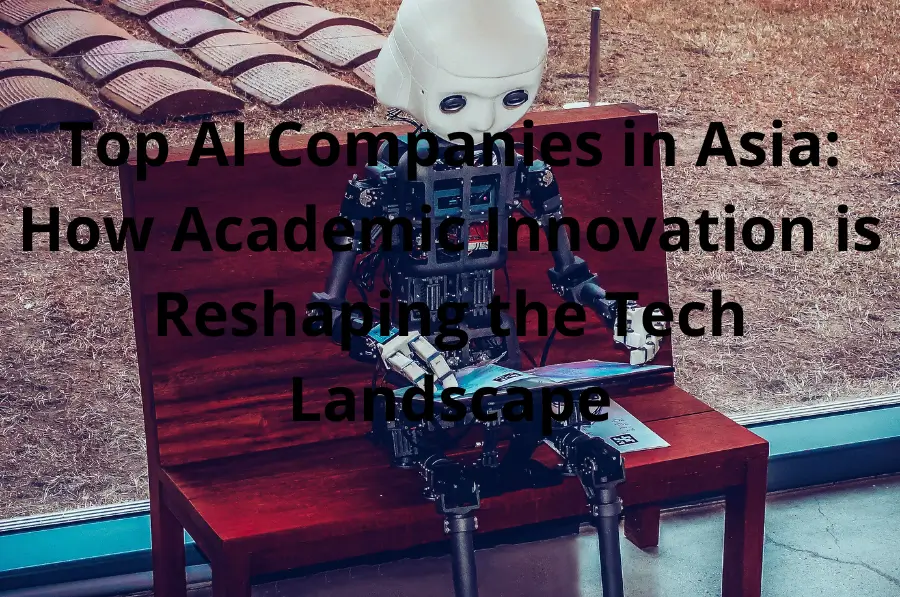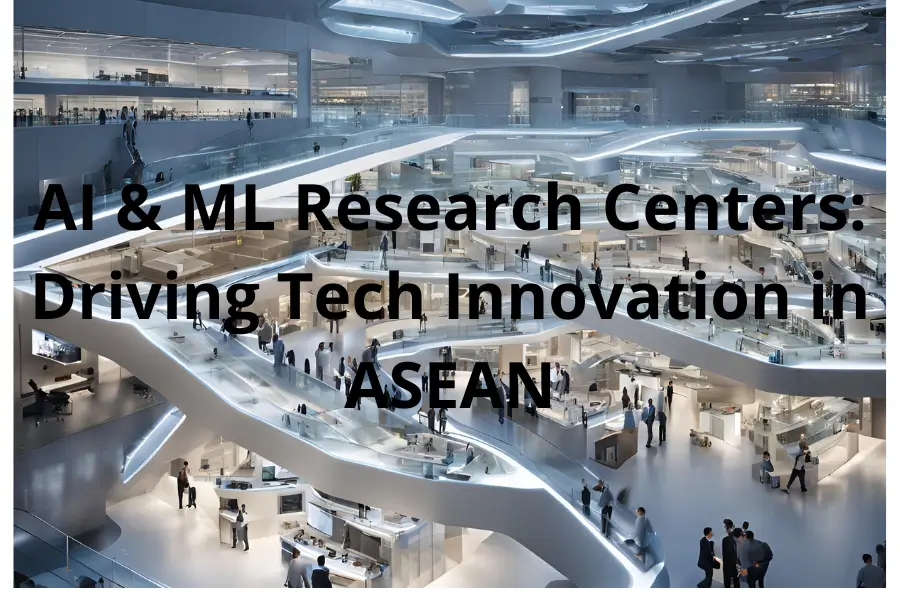
- The AI Boom in Asia: Not Just Another Tech Bubble
- The Brainiac Startups: When Professors Turn Entrepreneurs
- The Secret Sauce: University-Industry Partnerships
- Incubators and Accelerators: The AI Talent Factories
- The Crystal Ball: What’s Next for AI in Asia?
- The Final Byte
- FAQ: AI Companies and Academic Innovation in Asia
Hey there, tech enthusiasts and future AI overlords! The landscape of AI companies in Asia is evolving rapidly, with innovation hubs sprouting across the continent from Singapore to Seoul. The success of these companies is closely tied to the groundbreaking work being done in AI research centers in ASEAN. Today, we’re taking a deep dive into the pulsating heart of Asia’s AI scene. Buckle up, because this ride is going to be smoother than a robot’s pick-up line!
The AI Boom in Asia: Not Just Another Tech Bubble
Picture this: It’s 2023, and Asia’s AI market is hotter than a summer day in Singapore. According to the latest “State of AI in Asia” report, investments in AI companies across the region skyrocketed to a whopping $25 billion last year. That’s not just a growth spurt; it’s a full-on growth explosion!
But here’s the kicker – what’s really setting Asian AI companies apart isn’t just their fancy algorithms or bottomless funding. Nope, it’s their secret weapon: a symbiotic relationship with academia that’s tighter than a Python loop.
Dr. Lee Kai-Fu, AI guru and author of “AI Superpowers,” puts it perfectly: “The fusion of academic research and entrepreneurial spirit in Asia is creating a perfect storm for AI innovation. It’s not just about building products; it’s about pushing the boundaries of what’s possible.”
The Brainiac Startups: When Professors Turn Entrepreneurs
Let’s talk about some AI companies that are so smart, they make Siri look like a flip phone. First up, we’ve got SenseTime from Hong Kong. These folks aren’t just dabbling in computer vision; they’re redefining it. Founded by Prof. Tang Xiaoou from the Chinese University of Hong Kong, SenseTime is like the lovechild of a university research lab and a Silicon Valley startup.
Then there’s Preferred Networks in Japan. These guys are tighter with the University of Tokyo than sushi is with wasabi. Their specialty? Making robots smarter than your average bear (or human, for that matter).
But wait, there’s more! YITU Technology in China, born from the brains at Shanghai Jiao Tong University, is using AI to do everything from spotting tumors to catching bad guys. It’s like CSI meets The Terminator, but way cooler and less…Arnold-y.
The Secret Sauce: University-Industry Partnerships
Now, you might be thinking, “Cool startups, bro, but what’s the big deal?” Well, let me tell you about the magic that happens when universities and companies decide to tango.
The Samsung-KAIST AI Center is at the forefront of deep learning research in South Korea. It’s like the Avengers of AI, if the Avengers were really into deep learning and wore lab coats. This powerhouse collaboration is churning out innovations faster than you can say “artificial intelligence.”
Or how about AI Singapore? It’s not a new flavor of chicken rice; it’s a national program that’s got more universities involved than a college sports league. They’re tackling everything from language processing to smart city tech.
Prof. Ng Wai Kin from the National University of Singapore spills the tea: “These collaborations give us the best of both worlds. We get to work on cutting-edge research while seeing our ideas come to life in real-world applications. It’s exhilarating!”
Incubators and Accelerators: The AI Talent Factories
If startups are the rockstars of the AI world, then academic incubators are the talent shows that discover them. The Hong Kong University of Science and Technology’s AI Supercharger isn’t just a cool name; it’s a launchpad for the next generation of AI unicorns.
Appier, a Taiwanese AI marketing platform that’s now worth over $1 billion, got its start at National Taiwan University. It’s like they went from dorm room to boardroom, but with a lot more machine learning in between.
Dr. Vivian Li, a venture capitalist specializing in AI startups, notes: “These academic incubators are gold mines. They’re not just producing startups; they’re shaping the future of AI talent in Asia.”
The Crystal Ball: What’s Next for AI in Asia?
As we peer into the future (no, not with a magic 8-ball, but with data-driven insights), a few trends are clearer than a 4K display:
- Ethical AI: Asian researchers are leading the charge in developing AI that’s not just smart, but also fair and transparent. It’s like teaching a robot to have a conscience!
- AI for Good: From healthcare diagnostics to climate change solutions, Asian AI companies are proving that making money and making a difference aren’t mutually exclusive.
- Cross-Border Collaboration: The future of AI in Asia isn’t just about competition; it’s about collaboration. Imagine an AI project with the brains of Tokyo, the efficiency of Singapore, and the scale of China. Mind-blowing, right?
Dr. Ayesha Khanna, CEO of ADDO AI, sums it up beautifully: “The next wave of AI innovation in Asia will be characterized by its human-centric approach. We’re not just building smarter machines; we’re building a smarter, more inclusive future.”
The Final Byte
As we wrap up this whirlwind tour of Asia’s AI landscape, one thing’s crystal clear: the fusion of academic brilliance and entrepreneurial spirit is creating a perfect storm of innovation. It’s not just about algorithms and data; it’s about vision, collaboration, and a dash of that uniquely Asian blend of tradition and cutting-edge technology.
As we look to the future, it’s clear that AI companies in Asia will continue to play a pivotal role in shaping the global tech landscape, driven by their unique blend of academic rigor and entrepreneurial spirit.So, whether you’re a tech enthusiast, an investor, or just someone who wants to stay ahead of the curve, keep your eyes on Asia. Because when it comes to AI, this continent isn’t just playing the game – it’s changing it.
Remember, in the world of AI, the future isn’t just coming; it’s being coded, debugged, and optimized right here in Asia. And with the powerhouse combo of academia and industry leading the charge, that future is looking brighter than a supernova in 8K resolution!
FAQ: AI Companies and Academic Innovation in Asia
AI Landscape in Asia
Q: What makes AI companies in Asia unique compared to their global competitors?
A: Asian AI companies stand out due to their strong ties with academic institutions, fostering a unique blend of cutting-edge research and practical applications. This academic-industry collaboration accelerates innovation and helps in tackling region-specific challenges.
Q: How does the investment in AI in Asia compare to other regions?
A: Asia has seen significant growth in AI investments, with reports indicating billions of dollars poured into the sector annually. While exact comparisons vary, Asia is considered a major player alongside North America and Europe.
Leading Companies and Academic Connections
Q: Which are some of the top AI companies in Asia with academic roots?
A: Some notable examples include SenseTime (Hong Kong), Preferred Networks (Japan), and YITU Technology (China). These companies were founded by academics or maintain close ties with universities.
Q: How do university-industry collaborations benefit AI development in Asia?
A: These collaborations provide companies with access to top talent, state-of-the-art research facilities, and innovative ideas. Universities benefit from real-world application of their research and funding opportunities.
Incubators and Education
Q: What role do academic incubators play in the Asian AI ecosystem?
A: Academic incubators serve as launchpads for AI startups, providing mentorship, resources, and networking opportunities. They bridge the gap between academic research and commercial applications.
Q: How is AI education evolving in Asian universities?
A: Many Asian universities are expanding their AI programs, integrating AI into various disciplines, and collaborating with industry partners to ensure curricula meet real-world needs.
Trends and Challenges
Q: What are the emerging trends in AI research and development in Asia?
A: Key trends include ethical AI, AI for social good, cross-border collaborations, and applications in healthcare and smart cities. There’s also a growing focus on explainable AI and AI for sustainability.
Q: What challenges do AI companies in Asia face?
A: Challenges include regulatory hurdles, data privacy concerns, the need for ethical AI development, and intense competition both regionally and globally.
Global Impact and Opportunities
Q: What impact are Asian AI companies having on global technology trends?
A: Asian AI companies are significantly influencing global trends in areas like facial recognition, natural language processing, and AI-driven manufacturing, often setting new benchmarks in these fields.
Q: How can someone get involved in the AI industry in Asia?
A: Opportunities include pursuing AI-related education at Asian universities, joining AI startups or established companies, participating in hackathons and AI challenges, or engaging in research collaborations with academic institutions in the region.


